Historical Nonfiction
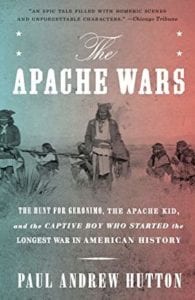
The Apache Wars: The Hunt for Geronimo, The Apache Kid, and the Captive Boy Who Started the Longest War in American History
by Paul Andrew Hutton
(Crown)
“They called him Mickey Free. His kidnapping started the longest war in American history, and both sides—the Apaches and the white invaders—blamed him for it. A mixed-blood warrior who moved uneasily between the worlds of the Apaches and the American soldiers, he was never trusted by either but desperately needed by both. He was the only man Geronimo ever feared. He played a pivotal role in this long war for the desert Southwest from its beginning in 1861 until its end in 1890 with his pursuit of the renegade scout, Apache Kid.
In this sprawling, monumental work, Paul Hutton unfolds over two decades of the last war for the West through the eyes of the men and women who lived it. This is Mickey Free’s story, but also the story of his contemporaries: the great Apache leaders Mangas Coloradas, Cochise, and Victorio; the soldiers Kit Carson, O. O. Howard, George Crook, and Nelson Miles; the scouts and frontiersmen Al Sieber, Tom Horn, Tom Jeffords, and Texas John Slaughter; the great White Mountain scout Alchesay and the Apache female warrior Lozen; the fierce Apache warrior Geronimo; and the Apache Kid. These lives shaped the violent history of the deserts and mountains of the Southwestern borderlands–a bleak and unforgiving world where a people would make a final, bloody stand against an American war machine bent on their destruction.”
Biography

Black Elk: The Life of an American Visionary
by Joe Jackson
(Farrar, Straus and Giroux)
“Black Elk, the Native American holy man, is known to millions of readers around the world from his 1932 testimonial Black Elk Speaks. Adapted by the poet John G. Neihardt from a series of interviews with Black Elk and other elders at the Pine Ridge Reservation in South Dakota, Black Elk Speaks is one of the most widely read and admired works of American Indian literature. Cryptic and deeply personal, it has been read as a spiritual guide, a philosophical manifesto, and a text to be deconstructed—while the historical Black Elk has faded from view. In this sweeping book, Joe Jackson provides the definitive biographical account of a figure whose dramatic life converged with some of the most momentous events in the history of the American West. Born in an era of rising violence between the Sioux, white settlers, and U.S. government troops, Black Elk killed his first man at the Little Bighorn, witnessed the death of his second cousin Crazy Horse, and traveled to Europe with Buffalo Bill’s Wild West show. Upon his return, he was swept up in the traditionalist Ghost Dance movement and shaken by the Massacre at Wounded Knee. But Black Elk was not a warrior, instead accepting the path of a healer and holy man, motivated by a powerful prophetic vision that he struggled to understand. Although Black Elk embraced Catholicism in his later years, he continued to practice the old ways clandestinely and never refrained from seeking meaning in the visions that both haunted and inspired him.
In Black Elk, Jackson has crafted a true American epic, restoring to its subject the richness of his times and gorgeously portraying a life of heroism and tragedy, adaptation and endurance, in an era of permanent crisis on the Great Plains.”
Contemporary Nonfiction
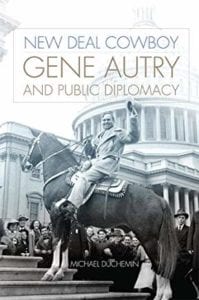
New Deal Cowboy: Gene Autry and Public Diplomacy
by Michael Duchemin
(University of Oklahoma Press)
“Best known to Americans as the “singing cowboy,” beloved entertainer Gene Autry (1907–1998) appeared in countless films, radio broadcasts, television shows, and other venues. While Autry’s name and a few of his hit songs are still widely known today, his commitment to political causes and public diplomacy deserves greater appreciation. In this innovative examination of Autry’s influence on public opinion, Michael Duchemin explores the various platforms this cowboy crooner used to support important causes, notably Franklin D. Roosevelt’s New Deal and foreign policy initiatives leading up to World War II.
As a prolific performer of western folk songs and country-western music, Autry gained popularity in the 1930s by developing a persona that appealed to rural, small-town, and newly urban fans. It was during this same time, Duchemin explains, that Autry threw his support behind the thirty-second president of the United States. Drawing on a wealth of primary sources, Duchemin demonstrates how Autry popularized Roosevelt’s New Deal policies and made them more attractive to the American public. In turn, the president used the emerging motion picture industry as an instrument of public diplomacy to enhance his policy agendas, which Autry’s films, backed by Republic Pictures, unabashedly endorsed.
As the United States inched toward entry into World War II, the president’s focus shifted toward foreign policy. Autry responded by promoting Americanism, war preparedness, and friendly relations with Latin America. As a result, Duchemin argues, “Sergeant Gene Autry” played a unique role in making FDR’s internationalist policies more palatable for American citizens reluctant to engage in another foreign war.
New Deal Cowboy enhances our understanding of Gene Autry as a western folk hero who, during critical times of economic recovery and international crisis, readily assumed the role of public diplomat, skillfully using his talents to persuade a marginalized populace to embrace a nationalist agenda. By drawing connections between western popular culture and American political history, the book also offers valuable insight concerning the development of leisure and western tourism, the information industry, public diplomacy, and foreign policy in twentieth-century America.”
Traditional Novel
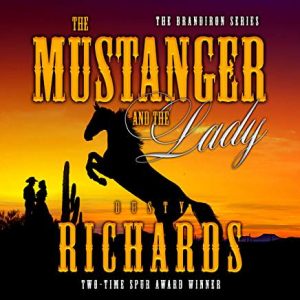
The Mustanger and the Lady
by Dusty Richards
(Galway Press)
“Vince is a mustanger with a solitary camp high in the Hondo Mountains, where he works his operation alone. He likes it that way.
Then, on a trip back from selling some mustangs, he comes across Julie, a saloon girl on the run from some pretty bad hombres. Vince takes her back to his camp with the idea that, as soon as her horse heals up, he’ll send her on her way. But then he falls in love with her. Before he knows it, her fight is his fight, and he’s looking forward to a life with her.
They just have to survive a small war first.”
Contemporary Novel
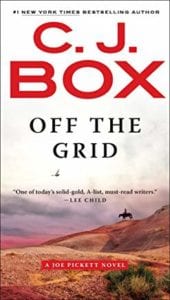
Off the Grid: A Joe Pickett Novel
by C.J. Box
(G.P. Putnam’s Sons)
“Nate is off the grid, recuperating from wounds and trying to deal with past crimes, when he is suddenly surrounded by a small team of elite professional special operators. They’re not there to threaten him, but to make a deal. They need help destroying a domestic terror cell in Wyoming’s Red Desert, and in return they’ll make Nate’s criminal record disappear.
But they are not what they seem, as Nate’s friend Joe Pickett discovers. They have a much different plan in mind, and it just might be something that takes them all down—including Nate and Joe.”
Mass-Market Paperback Novel
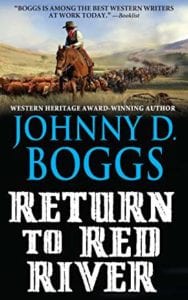
Return to Red River
by Johnny D. Boggs
(Pinnacle)
“Matthew Garth was orphaned in a savage wagon train ambush and adopted by Red River hero Thomas Dunson. Twenty years later Matt has two strapping sons of his own and is undertaking a desperate cattle drive from Texas to Dodge City, the new queen of frontier cattle towns.
While the deadly dangers of storms and rustlers gather around them, an act of passion and violence from within the drive—and from within the Garth family—leaves Matt fighting for his life, close to where his father was buried by the Red River. When Matt gets back up, he must finish the drive—and fight his worst enemies and even his own blood kin before it ends in a battle of guns, tears, and justice.”
Juvenile Nonfiction

The Wolves of Currumpaw
by William Grill
(Flying Eye Books)
“The Wolves of Currumpaw is a beautifully illustrated modern re-telling of Ernest Thompson Seton’s epic wilderness drama Lobo, the King of Currumpaw, originally published in 1898. Set in the dying days of the old west, Seton’s drama unfolds in the vast planes of New Mexico, at a time when man’s relationship with nature was often marked by exploitations and misunderstanding. This is the first graphic adaptation of a massively influential piece of writing by one of the men who went on to form the Boy Scouts of America.”
Juvenile Fiction
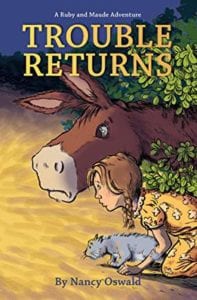
Trouble Returns: A Ruby & Maude Adventure
by Nancy Oswald
(Filter Press)
“Eleven-year-old Ruby is in an unbelievable amount of trouble. Trouble in school, trouble with the Sisters of Mercy, trouble with her cat named Trouble, and trouble with Pa after he proposes to the school principal. In 1896 Cripple Creek, Colorado, Ruby narrowly escapes death, and her donkey, Maude, steals the story with an unexpected surprise
Storyteller
(Illustrated Children’s Book)
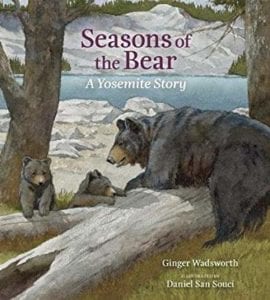
Seasons of the Bear: A Yosemite Story
by author Ginger Wadsworth and illustrator Daniel San Souci
(Yosemite Conservancy)
“This lovely picture book opens on a mother bear and her newborn cubs in their cozy den as a blanket of snow settles over Yosemite National Park. Her newborn cubs grow quickly and soon three furry, hungry black bears set out to experience their world.
Spring turns to summer, and the bears roam Tuolumne Meadows, munching tall grasses and keeping a safe distance from park visitors. But not all of the bears’ time is spent searching for food: Mama bear must remain on alert for danger and rush her cubs to safety when a forest fire rages close by or another bear threatens them. In the fall, they will fatten up on acorns before returning to their den for the winter
Ginger Wadsworth and Daniel San Souci give readers the bear’s eye view and a tour of the seasons in Yosemite’s high country with these fascinating and mighty creatures.”
Short Fiction

Odell’s Bones
by Troy D. Smith
(Cane Hollow Press)
“Alona Roberts lost her husband Odell five years ago to the Civil War, and now she has lost her children to fever. She has buried the young ones on their South Texas farm, but she cannot bear the thought of them resting there alone. Their father’s bones are buried where he fell, on a distant battlefield in Indian Territory. Alona has made up her mind: she must find the site, and bring Odell’s bones home to rest with their children. The problem is that Odell’s best friend Tarry Leonard is the only person who knows exactly where those bones rest—and he is a hopeless drunkard and a coward, who carries a dark secret.”
First Nonfiction Book
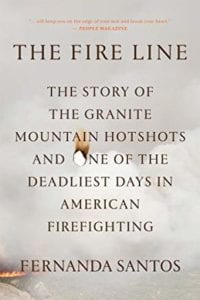
The Fire Line: The Story of the Granite Mountain Hotshots and One of the Deadliest Days in American Firefighting
by Fernanda Santos
(Flatiron Books)
“When a bolt of lightning ignited a hilltop in the sleepy town of Yarnell, Arizona, in June of 2013, setting off a blaze that would grow into one of the deadliest fires in American history, the twenty men who made up the Granite Mountain Hotshots sprang into action.
An elite crew trained to combat the most challenging wildfires, the Granite Mountain Hotshots were a ragtag family, crisscrossing the American West and wherever else the fires took them. The Hotshots were loyal to one another and dedicated to the tough job they had. There’s Eric Marsh, their devoted and demanding superintendent who turned his own personal demons into lessons he used to mold, train and guide his crew; Jesse Steed, their captain, a former Marine, a beast on the fire line and a family man who wasn’t afraid to say “I love you” to the firemen he led; Andrew Ashcraft, a team leader still in his 20s who struggled to balance his love for his beautiful wife and four children and his passion for fighting wildfires. We see this band of brothers at work, at play and at home, until a fire that burned in their own backyards leads to a national tragedy.
Impeccably researched, drawing upon more than a hundred hours of interviews with the firefighters’ families, colleagues, state and federal officials, and fire historians and researchers, New York Times Phoenix Bureau Chief Fernanda Santos has written a riveting, pulse-pounding narrative of an unthinkable disaster, a remarkable group of men and the raging wildfires that threaten our country’s treasured wild lands.”
First Novel
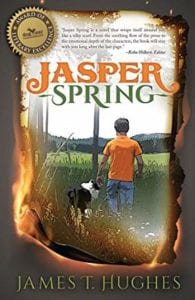
Jasper Spring
by James T. Hughes
(Dog Ear Publishing)
“This first novel tells the story of Alice and Tucker, the young stewards of Jasper Spring. Tucker’s family has lived on the ranch for generations, and the two look forward to filling the homestead with children of their own. After two miscarriages, their hope of a family is fading quickly and they feel farther apart than ever before. The only living thing that either one of them feels truly connected with is their border collie, Tommie, a dog with an uncanny sense of their needs.
Enter Ray—an ill dressed 11-year-old boy sorely neglected by his single mother. Ray stumbles across the gorgeous and isolated valley while out on an aimless spin with his dilapidated bicycle. When Tommie finds Ray, the boy is transfixed by the beautiful dog, and the collie’s natural instinct to herd spurs him to drive the boy into Tucker and Alice’s empty arms. The couple develops affection for the forsaken boy, and he feels truly at home for the first time in his young life. As their relationship deepens, shocking twists and turns are presented by the boy’s peripheral mother—with one that leads to catastrophe. The close trio is drawn into battle to preserve the land they love. Additional outside forces loom (drought and development). Though they have the help of two horses and a heroic dog, the struggle is intense and not without loss.
